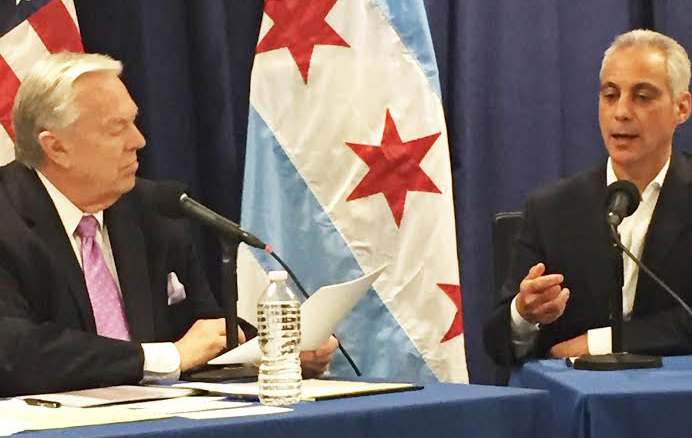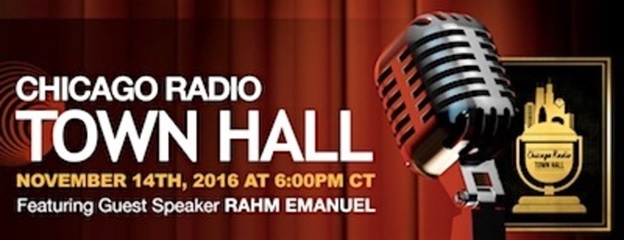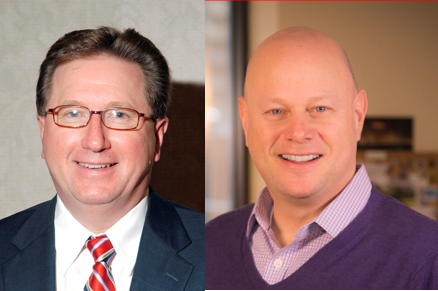
Yesterday, we posted about WDRV’s Bob Stroud and his on-air essay about the Cubs’ miraculous victory, and what it meant to Chicago.
Last night, another miracle may have occurred on Chicago radio – but of a much different type. More than 40 stations broke format for 30 minutes to carry a live town hall meeting with Mayor Rahm Emanuel, hosted by legendary Chicago news pro, Bill Kurtis. The time went by quickly, as Emanuel covered a lot of ground, reiterating his statement from earlier in the day that Chicago will always be “a sanctuary city” to immigrants.
In the middle of the Fall Book, with Christmas music already in the air, and carnivorous stations duking it out for every quarter-hour and listening occasion, how could something like this happen? What could convince all these stations from so many different companies (the list is here) to put down their weapons of ratings destruction for a half hour and come together as a show of civic duty and pride? And commercial-free, no less.
The collaboration started with the Radio Broadcasters of Chicagoland (a working committee of the Illinois Broadcasters Association) approaching Mayor Emanuel to look for ways radio could help the city. The unique broadcast was the end result – a tangible way to support Chicago and demonstrate the power and impact of local radio.
 The IBA’s President, Dennis Lyle, and The RBC’s head, Doug Levy, were the forces behind the “radio roadblock.” Lyle has served as the IBA’s leader since 1999. Levy, who is the market manager for Univision in Chicago, has been Chairman of the RBC for two years. Together they conceptualized this historic radio event.
The IBA’s President, Dennis Lyle, and The RBC’s head, Doug Levy, were the forces behind the “radio roadblock.” Lyle has served as the IBA’s leader since 1999. Levy, who is the market manager for Univision in Chicago, has been Chairman of the RBC for two years. Together they conceptualized this historic radio event.
Its goal, according to Levy, is “to facilitate a dialogue between the people of Chicago and our elected leader. We hope it is the beginning of an ongoing conversation that finds positive ways to make our home town better for everyone.”
The fact that it fell less than a week after a historic election that continues to roil the political waters is interesting. It’s a chance for radio to start a dialogue about the local issues that matter. And also provide proof of concept that radio connects, that radio cuts through.
The fact something like this has never happened before speaks to the spirit of Chicago broadcasters. As Levy points out, “There happens to be a group of people working in Chicago radio who are completely devoted to honoring their responsibilities as broadcasters. I am incredibly proud to be a member of my radio community.”

That said, we’re talking about bringing together broadcasters from companies that include iHeartMedia, Cumulus, CBS, Hubbard, Univision, Tribune, Chicago Public Radio (WBEZ), Salem, Alpha, and others.
So just how tough was it bringing that group together?
Levy says it wasn’t easy but that broadcasters put aside their differences to focus on the greater good: “Chicago radio station leaders all understand that the stations they run are incredibly powerful and critically important. There is no other medium that has as intimate a relationship with its audience as radio does. Radio broadcasters care deeply about the communities they serve and the enthusiasm shown by the Chicago radio broadcasters is proof of that dedication.”
And Lyle agrees: “There’s something about the radio operators in Chicago that defies the stereotypical competitive nature of the biz. Of course they are all competitive in nature, as they should be, but they eagerly “check their weapons at the door” whenever attending RBC meetings and when collectively working on something for the good of the cause, whether it’s doing something for the citizens within their communities of license, or for the residents of this planet as demonstrated in past successful fundraising efforts for victims of tsunamis, hurricanes, and tornadoes, or for the good of the industry in telling the story of radio as an extremely effective advertising vehicle.”
Will there be another town meeting with Mayor Emanuel or other political dignitaries willing to participate in an all-market radio broadcast? It will be interesting to see how this evolves for the Chicago radio community. At a time when radio is taken for granted by the ad community and so many others, this was an opportunity for radio to shine and be noticed.
Whether the idea can be transplanted to other radio “communities” is the bigger question. How can broadcasters uniquely serve their hometowns, while demonstrating the power of radio in the lives of citizens? Do they have the courage and foresight to call a temporary truce to benefit their cities of license, as well as a medium that is so often taken for granted?
As we know, radio is a lemming business. A format that scores in a single, high-profile market can end up all over the U.S. in a year. A strong morning show can use syndication to land itself on scores of stations. A town hall meeting with the mayor that every station in town airs?
As they say, stay tuned.
- What To Do If Your Radio Station Goes Through A Midlife Crisis - April 25, 2025
- A 2020 Lesson?It Could All Be Gone In A Flash - April 24, 2025
- How AI Can Give Radio Personalities More…PERSONALITY - April 23, 2025




Outstanding Team Work! Clark, Boston.
Absolutely! Thanks, Clark.
Two things to point out: Not everyone participated in the event. The Crawford stations, including urban Power 92, didn’t participate and no other non-com than WBEZ participated, including Moody’s WMBI, which has one of the biggest signals in the city, and College of DuPage’s WDCB, an NPR member station funded by the CPB. Was there any attempt to attract non-coms other than BEZ, or did the organizers think that the college stations would tell them to take their capitalist butts away from them and playing punk bands is more important than the city of Chicago?
And related here is that when Chicago media blogger Robert Feder initially wrote about the event, almost all of his comments were negative about it, seemingly because a mayor who has not been particularly loved by a lot of Chicagoans (and one of a long series of Chicago Democratic mayors detested by the small number in Chicago of Republicans and progressive Democrats and independents). Which makes me wonder if those complaints would have been made if the program featured President-elect Trump or Jill Stein.
Mark, I do not know the answer to either of your questions as I’m following this story from a distance. Even with these omissions, it is still an impressive feat. Not just because this is inherently a political event, there are always politics involved, right? It looks like both organizations did a great job of working around it.